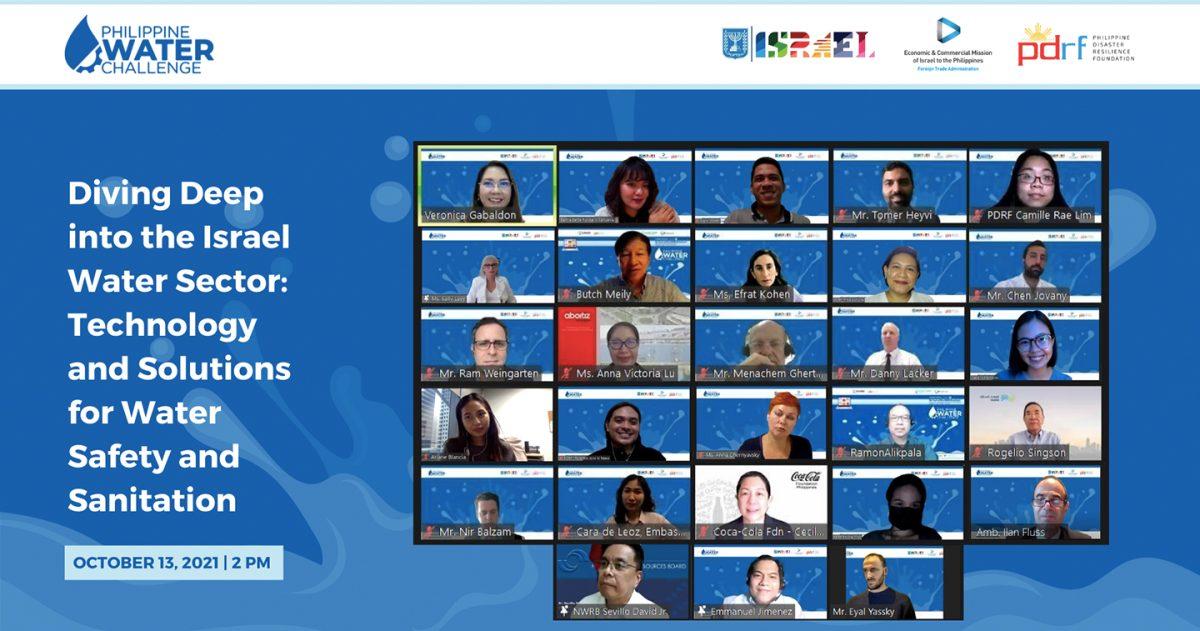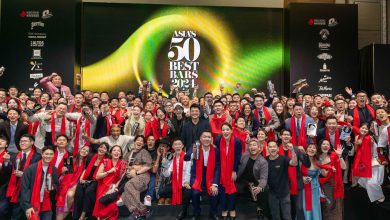MANILA, PHILIPPINES — Filipino and Israeli water experts gathered together in an online knowledge-sharing session last October 13 to explore potential solutions to address the Philippines’ water supply and sanitation problems.
Over 200 participants from local and international organizations attended the “Diving Deep into the Israel Water Sector: Technology and Solutions for Water Safety and Sanitation” webinar organized by the Philippine Disaster Resilience Foundation (PDRF), the Embassy of Israel in the Philippines, and Israel Economic and Commercial Mission to the Philippines. This event was part of the ongoing Philippine Water Challenge (PhlWC), launched by the USAID Safe Water Project, PDRF, Manila Water, and Maynilad to engage different sectors in finding solutions to the country’s water crisis.
According to the 2021 Sustainable Development Report, the Philippines only ranks 103rd of 193 countries in terms of achieving all 17 Sustainable Development Goals (SDGs). It has completed only one out of five Clean Water and Sanitation Goal indicators: 1.9 m³/capita of water consumption embodied in imports. Significant challenges remain for access to essential drinking water and sanitation services, available freshwater resources, and adequate wastewater treatment.
The Embassy of Israel in the Philippines believes that there are many opportunities to discover solutions to address water and sanitation supply challenges. Key innovations from the Israeli Water Sector may serve as a springboard for new ideas.
More than half of Israel is covered in desert and there is hardly any rain. Due to limited water resources, they developed policies and unconventional solutions to improve the country’s water sufficiency. Thus, Israel has become one of the best in the world in the field of water, sanitation, and technologies.
“Once you arrive in Israel, you realize how developed the water sector is, with great achievements in our land, fruitful in agriculture and water-sufficient. From the lack of resources, we developed our most impressive water innovations, including irrigation, filtration, leak detection, and much more. Israel is also a world leader in water recycling as we reuse nearly 90% of our wastewater,” said Israel Embassy Deputy Chief of Mission Nir Balzam.
Head of the Water and Security and Emergency Division of the Israel Water Authority Danny Lacker also emphasized that preparation is key to overcome hurdles and create solutions to any challenge.
“You cannot fall into any challenge in the water system without being prepared in advance, meaning: thinking about it, using technology, drilling, and operating in times of crisis. In Hebrew we have a nice saying that ‘whoever cooks on Friday will eat on Saturday.’ So that’s what you should keep in mind: be prepared in advance,” Lacker said.
Economic Counsellor and Head of the Israel Economic & Commercial Mission to the Philippines Tomer Heyvi encouraged Filipino participants to explore Israeli technologies and solutions to get inspiration to address the Philippine water crisis. He also emphasized the importance of cooperation between the two countries using the innovation and application of the best practices of Israel in water management suited for the Philippines.
Guest speakers included Sally Levi (Meniv Rishon Ltd), Ram Weingarten (Bermad Water Control Solutions), Menachem Ghertner (Odis), Anna Chernyavsky (WaterGen), Efrat Kohen (Shafdan), and Eyal Yassky (Hilico).
Panelists who shared their insights and best practices were Anna Victoria Lu (Aboitiz InfraCapital and Apo Agua), Maria Cecilia Alcantara (Coca-Cola Foundation Philippines, Inc.), Sevillo David, Jr. (National Water Resources Board), Rogelio Singson (Metro Pacific Water), Emmanuel Jimenez (Manila Water Company, Inc.), and Chen Jovany (The Israel Export and International Cooperation Institute. The panel discussions were moderated by Ramon “Dondi” Alikpala of FutureWater Asia.
The Philippine Water Challenge (PhlWC) is an annual competition that serves as a platform for generating water supply and sanitation solutions for water service providers and users. By recognizing promising solutions, the PhlWC will help achieve the objectives of the Philippine Water Supply and Sanitation Master Plan for improving access to water-stressed communities.
“I believe that this competition can generate new solutions and a heightened awareness of how vulnerable we are as a nation to the vagaries of nature. Once and for all, let us make water resources available to all Filipinos,” said PDRF President Butch Meily.
Submission of applications for the Philippine Water Challenge has been extended to October 31, 2021. For more information, visit www.pdrf.org/philippinewaterchallenge/








